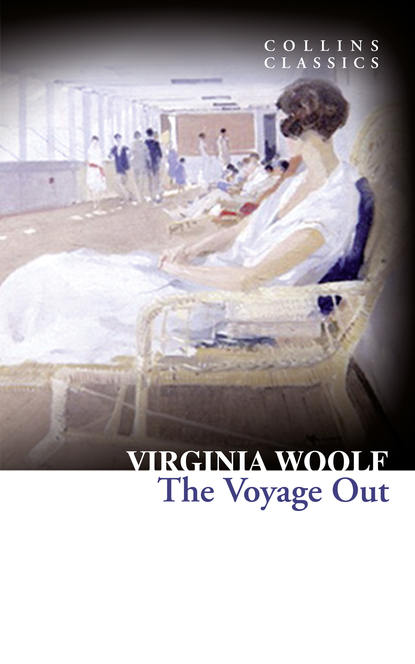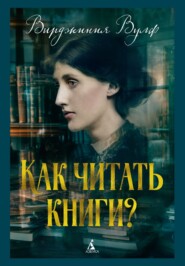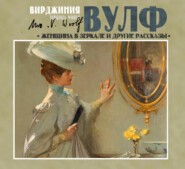По всем вопросам обращайтесь на: info@litportal.ru
(©) 2003-2025.
✖
The Voyage Out
Автор
Год написания книги
2019
Настройки чтения
Размер шрифта
Высота строк
Поля
It was a beautiful evening, still light enough to see a long way down the road, though the stars were coming out. The pillar-box was let into a high yellow wall where the lane met the road, and having dropped the letters into it, Helen was for turning back.
“No, no,” said Rachel, taking her by the wrist. “We’re going to see life. You promised.”
“Seeing life” was the phrase they used for their habit of strolling through the town after dark. The social life of Santa Marina was carried on almost entirely by lamp-light, which the warmth of the nights and the scents culled from flowers made pleasant enough. The young women, with their hair magnificently swept in coils, a red flower behind the ear, sat on the doorsteps, or issued out on to balconies, while the young men ranged up and down beneath, shouting up a greeting from time to time and stopping here and there to enter into amorous talk. At the open windows merchants could be seen making up the day’s account, and older women lifting jars from shelf to shelf. The streets were full of people, men for the most part, who interchanged their views of the world as they walked, or gathered round the wine-tables at the street corner, where an old cripple was twanging his guitar strings, while a poor girl cried her passionate song in the gutter. The two Englishwomen excited some friendly curiosity, but no one molested them.
Helen sauntered on, observing the different people in their shabby clothes, who seemed so careless and so natural, with satisfaction.
“Just think of the Mall to-night!” she exclaimed at length. “It’s the fifteenth of March. Perhaps there’s a Court.”
She thought of the crowd waiting in the cold spring air to see the grand carriages go by. “It’s very cold, if it’s not raining,”
she said. “First there are men selling picture postcards; then there are wretched little shop-girls with round bandboxes; then
there are bank clerks in tail coats; and then—any number of dressmakers. People from South Kensington drive up in a hired fly; officials have a pair of bays; earls, on the other hand, are allowed one footman to stand up behind; dukes have two, royal dukes—so I was told—have three; the king, I suppose, can have as many as he likes. And the people believe in it!”
Out here it seemed as though the people of England must be shaped in the body like the kings and queens, knights and pawns of the chessboard, so strange were their differences, so marked and so implicitly believed in.
They had to part in order to circumvent a crowd.
“They believe in God,” said Rachel as they regained each other. She meant that the people in the crowd believed in Him; for she remembered the crosses with bleeding plaster figures that stood where foot-paths joined, and the inexplicable mystery of a service in a Roman Catholic church.
“We shall never understand!” she sighed.
They had walked some way and it was now night, but they could see a large iron gate a little way farther down the road on their left.
“Do you mean to go right up to the hotel?” Helen asked.
Rachel gave the gate a push; it swung open, and, seeing no one about and judging that nothing was private in this country, they walked straight on. An avenue of trees ran along the road, which was completely straight. The trees suddenly came to an end; the road turned a corner, and they found themselves confronted by a large square building. They had come out upon the broad terrace which ran round the hotel and were only a few feet distant from the windows. A row of long windows opened almost to the ground. They were all of them uncurtained, and all brilliantly lighted, so that they could see everything inside. Each window revealed a different section of the life of the hotel. They drew into one of the broad columns of shadow which separated the windows and gazed in. They found themselves just outside the dining-room. It was being swept; a waiter was eating a bunch of grapes with his leg across the corner of a table. Next door was the kitchen, where they were washing up; white cooks were dipping their arms into cauldrons, while the waiters made their meal voraciously off broken meats, sopping up the gravy with bits of crumb. Moving on, they became lost in a plantation of bushes, and then suddenly found themselves outside the drawing-room, where the ladies and gentlemen, having dined well, lay back in deep arm-chairs, occasionally speaking or turning over the pages of magazines. A thin woman was flourishing up and down the piano.
“What is a dahabeeyah, Charles?” the distinct voice of a widow, seated in an arm-chair by the window, asked her son.
It was the end of the piece, and his answer was lost in the general clearing of throats and tapping of knees.
“They’re all old in this room,” Rachel whispered.
Creeping on, they found that the next window revealed two men in shirt-sleeves playing billiards with two young ladies.
“He pinched my arm!” the plump young woman cried, as she missed her stroke.
“Now you two—no ragging,” the young man with the red face reproved them, who was marking.
“Take care or we shall be seen,” whispered Helen, plucking Rachel by the arm. Incautiously her head had risen to the middle of the window.
Turning the corner they came to the largest room in the hotel, which was supplied with four windows, and was called the Lounge, although it was really a hall. Hung with armour and native embroideries, furnished with divans and screens, which shut off convenient corners, the room was less formal than the others, and was evidently the haunt of youth. Signor Rodriguez, whom they knew to be the manager of the hotel, stood quite near them in the doorway surveying the scene—the gentlemen lounging in chairs, the couples leaning over coffee-cups, the game of cards in the centre under profuse clusters of electric light. He was congratulating himself upon the enterprise which had turned the refectory, a cold stone room with pots on trestles, into the most comfortable room in the house. The hotel was very full, and proved his wisdom in decreeing that no hotel can flourish without a lounge.
The people were scattered about in couples or parties of four, and either they were actually better acquainted, or the informal room made their manners easier. Through the open window came an uneven humming sound like that which rises from a flock of sheep pent within hurdles at dusk. The card-party occupied the centre of the foreground.
Helen and Rachel watched them play for some minutes without being able to distinguish a word. Helen was observing one of the men intently. He was a lean, somewhat cadaverous man of about her own age, whose profile was turned to them, and he was the partner of a highly-coloured girl, obviously English by birth.
Suddenly, in the strange way in which some words detach themselves from the rest, they heard him say quite distinctly:—
“All you want is practice, Miss Warrington; courage and practice—one’s no good without the other.”
“Hughling Elliot! Of course!” Helen exclaimed. She ducked her head immediately, for at the sound of his name he looked up. The game went on for a few minutes, and was then broken up by the approach of a wheeled chair, containing a voluminous old lady who paused by the table and said:—
“Better luck to-night, Susan?”
“All the luck’s on our side,” said a young man who until now had kept his back turned to the window. He appeared to be rather stout, and had a thick crop of hair.
“Luck, Mr. Hewet?” said his partner, a middle-aged lady with spectacles. “I assure you, Mrs. Paley, our success is due solely to our brilliant play.”
“Unless I go to bed early I get practically no sleep at all,” Mrs. Paley was heard to explain, as if to justify her seizure of Susan, who got up and proceeded to wheel the chair to the door.
“They’ll get some one else to take my place,” she said cheerfully. But she was wrong. No attempt was made to find another player, and after the young man had built three stories of a card-house, which fell down, the players strolled off in different directions.
Mr. Hewet turned his full face towards the window. They could see that he had large eyes obscured by glasses; his complexion was rosy, his lips clean-shaven; and, seen among ordinary people, it appeared to be an interesting face. He came straight towards them, but his eyes were fixed not upon the eavesdroppers but upon a spot where the curtain hung in folds.
“Asleep?” he said.
Helen and Rachel started to think that some one had been sitting near to them unobserved all the time. There were legs in the shadow. A melancholy voice issued from above them.
“Two women,” it said.
A scuffling was heard on the gravel. The women had fled. They did not stop running until they felt certain that no eye could penetrate the darkness and the hotel was only a square shadow in the distance, with red holes regularly cut in it.
CHAPTER 9 (#ulink_800fdb43-6a65-5e88-b511-06c5fd5c71e4)
An hour passed, and the downstairs rooms at the hotel grew dim and were almost deserted, while the little box-like squares above them were brilliantly irradiated. Some forty or fifty people were going to bed. The thump of jugs set down on the floor above could be heard and the clink of china, for there was not as thick a partition between the rooms as one might wish, so Miss Allan, the elderly lady who had been playing bridge, determined, giving the wall a smart rap with her knuckles. It was only matchboard, she decided, run up to make many little rooms of one large one. Her grey petticoats slipped to the ground, and, stooping, she folded her clothes with neat, if not loving fingers, screwed her hair into a plait, wound her father’s great gold watch, and opened the complete works of Wordsworth. She was reading the “Prelude,” partly because she always read the “Prelude” abroad, and partly because she was engaged in writing a short PrimerofEnglishLiterature—BeowulftoSwinburne
Вы ознакомились с фрагментом книги.
Приобретайте полный текст книги у нашего партнера:
Приобретайте полный текст книги у нашего партнера:

















